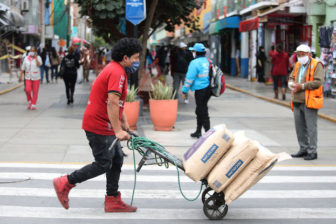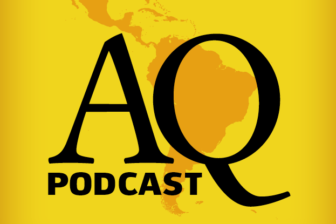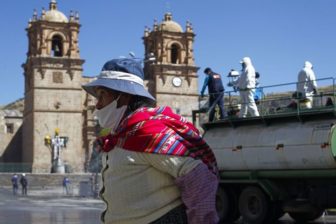This article is adapted from AQ’s special report on fighting the effects of the COVID-19 pandemic. See all 5 Big Ideas for recovery here:
Guarantee Income | A New Trade Push | Universal Health Care
Not Just GDP | Keep Kids in School
SANTIAGO – What a year 2020 has been. But Latin America and the Caribbean are certainly not alone as we face the challenges imposed by the pandemic. The spread of the new coronavirus was set against the backdrop of the crisis of multilateralism, growing inequality, climate change, trade wars, unprotected migration, demographic change and mounting global geopolitical tensions.
The job ahead is to rebuild and restart, better. But what will be our goal? Which yardstick should we use?
Download our 5 Big Ideas special report as a PDF
Even before these multiple crises arose, there was a growing international recognition that well-being is multidimensional and cannot be captured exclusively through monetary metrics. When countries focus solely on increasing their annual gross domestic product (GDP), concerns for the environment, erasing poverty or even basic services such as providing safe drinking water run the risk of being left on the back burner.
This does not mean that we should stop measuring GDP, but rather that it must be complemented with information that captures dimensions of well-being and sustainability beyond economic production. Make no mistake, economic growth is needed to boost the population’s well-being, but that growth must take place within the framework of a new development pattern—one that is compatible with using natural resources sustainably and reducing social gaps, among other considerations.
The focus on sustainable growth is crucial for a more comprehensive regional recovery after the coronavirus pandemic. To get there, we need to improve our yardsticks.
What follows are some ideas on how to do that.
Measuring inequality
The challenges involved in producing relevant and timely statistical information for decision-making, for both nation-states and the international cooperation system, are enormous.
One main critical issue is how we monitor inequalities.
First, there is a need to improve the way we measure the income of the richest segments of the population. Current household surveys have limitations to gauge and portray these groups accurately. The way forward is to use information from other sources, such as tax and administrative records. The challenge is to develop methodologies that make these data sources compatible and comparable across countries. Information is also needed on the concentration of wealth and assets — the region is only just beginning to develop statistical competencies in this area.
Steps should also be taken toward capturing other manifestations of inequality, such as the concentration of power and information.
For low-income earners, we must measure inequalities in the quality of education, health, housing, employment and social security. In many of the region’s countries, asymmetries in these areas tend to be expressed more in differences in quality than in access itself. Disparities in the quality of employment are particularly significant, as they are linked to the structural gaps that characterize the region’s labor market and to the disparities in educational attainment—two factors that help to perpetuate inequality and poverty over time. And inequality itself is a costly inefficiency.
When it comes to statistics, the tools we have are better for measuring the quality of employment than that of education. Most countries undertake specific employment surveys, while there is not yet a regular, standard test to measure knowledge and skills acquired in schools that is applied in all the countries of the region.
For low-income earners, we must measure inequalities in quality of education, health, housing, employment and social security.
To build a detailed overview of inequality, we need information that can be disaggregated by gender, ethnicity, age group, area of residence and disabilities, among other factors. In the area of gender, disparities in time use and unpaid work are of particular interest. These elements perpetuate women’s subordinate status, as do gaps in access to and quality of paid work. There are significant statistical challenges in this area, as there is in the data-collection instruments used to collate information on domestic violence, and particularly femicide, the most obvious manifestations of patriarchal societies that choose to victimize women.
With regard to indigenous and Afro-descendant populations, it is important to have data to monitor racist and discriminatory practices, as well as the perceptions of the affected groups. Otherwise, in the absence of disaggregated information, we will be blind to who is being left behind in our societies and could mistakenly believe that an improvement in the averages benefits everyone equally.
We are in the midst of an unprecedented technological and data revolution. The availability of new sources of big data and the development of artificial intelligence techniques are a promising way to increase the knowledge of our societies. But accessing such information to generate official statistics that can be used to formulate public policies is still a challenge that remains unaddressed.
Uncovering a bad picture
Collecting all this data is even more important given what we’ve learned from COVID-19; the pandemic put a spotlight on all these manifestations of deprivation in Latin America. Overcrowding and lack of access to water and sanitation facilities have contributed significantly to the rise in infections among the poorest populations.
The region has seen how the precariousness of employment and inadequate economic relief measures for the most vulnerable populations have limited the effectiveness of lockdowns and social distancing measures. Moreover, despite official remote learning mandates, it has been difficult to continue school activities in countries where many children and young people do not have access to a computer or an Internet connection.
Increasing levels of air, water, soil and ocean pollution affect human and ecosystem health.
At the Economic Commission for Latin America and the Caribbean, we are currently in the process of designing a regionally comparable multidimensional poverty index that includes all these deprivation indicators and that can contribute to track the well-being of the population with a broader perspective than income alone.
The persistence of inequality and deepening of poverty as a result of the COVID-19 pandemic, against the backdrop of a serious environmental and climate crisis, is not only jeopardizing well-being now but also threatens the natural heritage that will be available to future generations. The extraction of natural resources at rates above their replenishment level, and increasing levels of air, water, soil and ocean pollution, affect human and ecosystem health. To move toward a more sustainable development pattern, statistical information is required to determine the conservation status of natural heritage, in particular that of nonrenewable goods, and data is also needed to monitor international commitments on reducing carbon emissions.
The climate emergency is causing more intense and frequent natural disasters with considerable human, infrastructure and economic costs, which hit the most vulnerable populations hardest. It is therefore essential to quantify the impact and geographical spread of these events, paying particular attention to populations with fewer resources, especially in the region’s cities, which are highly segregated. Information on investment in climate resilience and improved post-disaster reconstruction is also required.
While a great deal of progress has been made in recent years in the production of environment, climate and sustainable development indicators, capacity-building in this area still requires additional investment for this information to be incorporated into more comprehensive metrics of sustainable well-being for all. A long-term frame must also be incorporated to compare inter-generational inequality, particularly in light of the current climate emergency and the environmental crisis that we are bequeathing to future generations.
Statistics must be our friend in the pursuit of sustainable targets; a focus on GDP alone won’t take us there.
Subjective indicators of well-being and discontent are largely absent from the region’s official statistics. These indicators are important, as any initiative to create redistributive social pacts that seek to provide a minimum level of well-being for the population will require citizens’ support if they are to be sustained over time. To this end, some critical indicators are those that measure trust in institutions and perceptions of abuse, corruption and inequality. Over the course of the COVID-19 pandemic, we have seen how public policy initiatives have been eroded by public distrust of institutions, even those linked to the scientific community. Mistrust and the feeling of being manipulated by an elite not only impair the effectiveness of responses to the pandemic but could also further undermine the democratic order in the medium term.
Ahead of us is the challenge of increasing the understanding of the relationships among the different dimensions of well-being — and the need to incorporate those in our decision-making at all levels of government and private-sector activity.
Statistics must be our friend in the pursuit of sustainable targets; a focus on GDP alone won’t take us there. They must be incorporated as an integral part of the design and evaluation of our public policies. Otherwise, the increase in the availability of information will not be enough to achieve a more comprehensive understanding of the regional situation and to take the necessary actions for attaining sustainable growth and improving Latin America’s well-being
—
Bárcena is the executive secretary of the Economic Commission for Latin America and Caribbean (ECLAC). This article had the support of Rolando Ocampo, director of the Statistics Division of ECLAC; Xavier Mancero, chief of the social statistics unit of the Statistics Division; Rayen Quiroga, statistician of the Statistics Division; and Pablo Villatoro, senior statistician.







